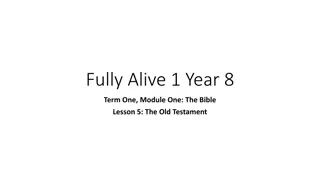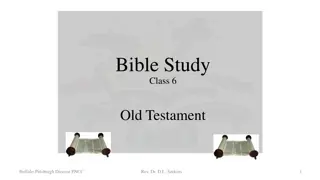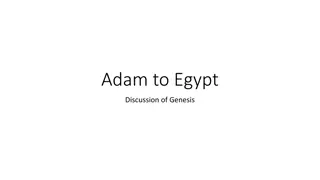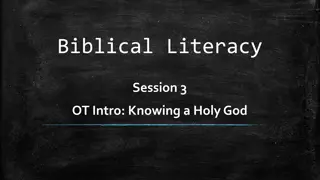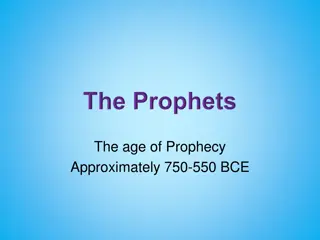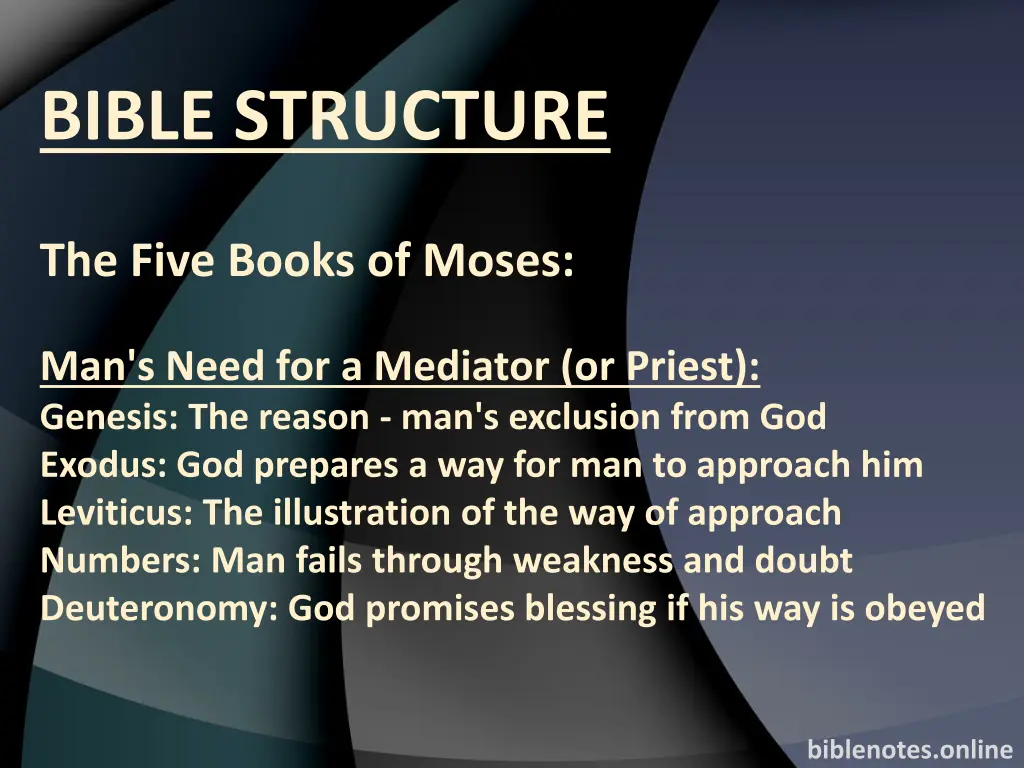
Understanding the Five Books of Moses and their Themes
Explore the structure and themes of the Five Books of Moses – Genesis, Exodus, Leviticus, Numbers, and Deuteronomy. From man's need for a mediator to God's promises of blessings, each book showcases different aspects of human relationship with the divine.
Download Presentation

Please find below an Image/Link to download the presentation.
The content on the website is provided AS IS for your information and personal use only. It may not be sold, licensed, or shared on other websites without obtaining consent from the author. If you encounter any issues during the download, it is possible that the publisher has removed the file from their server.
You are allowed to download the files provided on this website for personal or commercial use, subject to the condition that they are used lawfully. All files are the property of their respective owners.
The content on the website is provided AS IS for your information and personal use only. It may not be sold, licensed, or shared on other websites without obtaining consent from the author.
E N D
Presentation Transcript
BIBLE STRUCTURE The Five Books of Moses: Man's Need for a Mediator (or Priest): Genesis: The reason - man's exclusion from God Exodus: God prepares a way for man to approach him Leviticus: The illustration of the way of approach Numbers: Man fails through weakness and doubt Deuteronomy: God promises blessing if his way is obeyed biblenotes.online
LIST GENESIS - THE BOOK OF BEGINNINGS EXODUS - THE EMERGENCE OF THE NATION LEVITICUS - THE BOOK OF LAWS NUMBERS - THE BOOK OF WANDERING DEUTERONOMY - THE BOOK OF REVIEWS biblenotes.online
GENESIS - THE BOOK OF BEGINNINGS 1. GENERATION: GOD'S ACTIVITY (Ch. 1-2) 1.1 Material, Plant, Animal, Man 1.2 Man given responsibility and limitations 2. DEGENERATION: MAN'S CORRUPTION (Ch. 3-11) 2.1 Disobedience of the Individual 2.2 Failure of the Family 2.3 Degeneration of Society 2.4 Rebellion of Nations 3. REGENERATION: GOD'S ACTIVITY (Ch. 12-50) 3.1 Of Individuals - Abraham, Isaac and Jacob 3.2 Of Family - Jacob and his sons 3.3 Of Society - Joseph 3.4 Of the beginnings of a Nation biblenotes.online
EXODUS - THE EMERGENCE OF THE NATION 1. SLAVERY (Ch. 1-5) 1.1 Israel in Egypt 1.2 Israel and Pharaoh 2. DELIVERANCE (Ch. 6-18) 2.1 God and Moses 2.2 God and Pharaoh 2.3 God and Israel 3. ORGANISATION (Ch. 19-40) 3.1 The Purpose (Grace) and the Plan (Law) 3.2 Laws 3.3 Worship biblenotes.online
LEVITICUS - THE BOOK OF LAWS 1. DEDICATION - Worship and Sacrifice (Ch. 1-7) 1.1 The Offerings to God 2. MEDIATION - The Priests (Ch. 8-10) 2.1 Consecration 2.2 Duties 3. SEPARATION - For Holiness (Ch. 19-40) 3.1 A People God-governed 3.2 A People God-manifesting 4. CONSECRATION (Ch. 23-24) 4.1 The Appointed Feasts 4.2 The Symbols 5. RATIFICATION - The Signs (Ch. 25-27) 5.1 The Obligations and Responsibilities biblenotes.online
NUMBERS - THE BOOK OF WANDERING 1. ON THE MARGIN OF THE LAND (Ch. 1-10) 1.1 The Encampment 1.2 Purity 1.3 Worship 1.4 Movement 2. EXCLUSION AND WANDERING (Ch. 11-25) 2.1 Discontent 2.2 Rebellion 2.3 Discipline 3. ON THE MARGIN OF THE LAND (Ch. 26-36) 3.1 Census 3.2 Repetition of Laws 3.3 War with Midian 3.4 Settlement starts biblenotes.online
DEUTERONOMY - THE BOOK OF REVIEWS 1. RETROSPECT (Ch. 1-4) 1.1 Review of the 40 Years 1.2 Cities of Refuge 2. RESUME OF LAWS (Ch. 4-27) 2.1 Review of Law 2.2 Importance of Obedience 2.3 Statutes and Judgements 3. WARNINGS (Ch. 27-28) 3.1 Blessings of Obedience 3.2 Curses of Disobedience 4. THE COVENANT (Ch. 29-31) 5. THE SONG (Ch. 31-32) 6. THE BLESSING (Ch. 33) 7. HISTORIC CONCLUSION (Ch. 34) biblenotes.online

